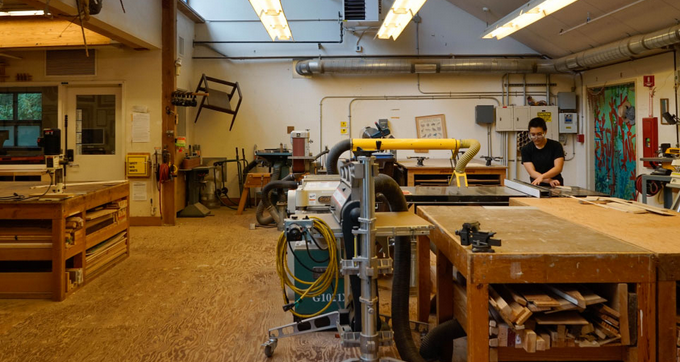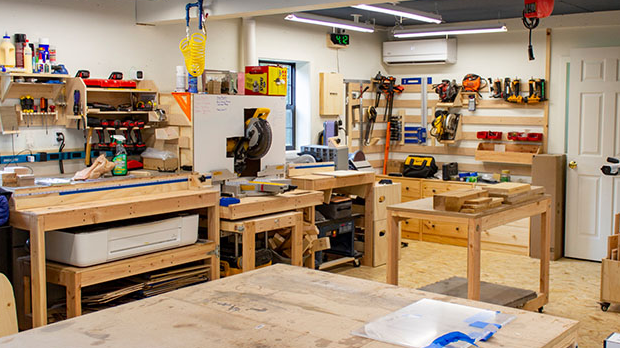Woodworking is a craft that not only shapes wood but also forges connections within communities. Community woodshops, often referred to as shared or cooperative workshops, have become hubs for artisans of all skill levels. They offer access to tools, knowledge, and a vibrant community, turning woodworking into a collective experience.

A Space for All: The Essence of Community Woodshops
They provide a haven where individuals can access equipment, regardless of their skill level or budget constraints. These workshops cultivate a sense of belonging, emphasizing that woodworking is for everyone.
The Power of Shared Resources
At the heart of community woodshops lies the concept of shared resources. Rather than investing in expensive tools and machinery, members can utilize communal equipment. This not only makes woodworking more affordable but also reduces the barrier to entry, allowing beginners to explore their passion without a hefty initial investment.
Mentorship and Skill-Sharing
One of the most valuable aspects of community woodshops is the mentorship and skill-sharing opportunities they offer. Experienced woodworkers often frequent these spaces, generously sharing their knowledge with newcomers. This mentorship fosters skill development and promotes a culture of continuous learning.
The Thriving Woodworking Community
Woodworking can be a solitary endeavour, but community woodshops change that dynamic. They transform woodworking into a communal experience, where artisans gather to collaborate, inspire, and celebrate each other’s creations. This sense of community enhances the joy of woodworking.
Access to Varied Expertise
Whether you’re curious about carving, joinery, or turning, you can tap into the collective wisdom of fellow woodworkers. This access to varied expertise broadens your woodworking horizons.
Safety First: Learning Best Practices
Safety is a paramount concern in woodworking, and community woodshops prioritize it. Members receive guidance on safe tool usage and best practices. Novices gain the confidence to use machinery correctly, reducing the risk of accidents.
Project Collaboration: From Ideas to Reality
Community woodshops often serve as incubators for collaborative projects. Woodworkers can join forces to create larger, more ambitious pieces, combining their skills and creativity. Such collaborations result in stunning works of art that reflect the collective spirit of the workshop.
Fostering Creativity: Open to All Ideas
There’s room for unconventional ideas and artistic expression. Whether you want to craft functional furniture or abstract sculptures, these workshops support your creative journey.
Membership Benefits: Cost-Effective Access
Most community woodshops operate on a membership basis, making them a cost-effective solution for regular woodworkers. Members typically pay a monthly or annual fee, which grants them unlimited access to the workshop’s facilities during operating hours.
Building Sustainable Practices
Many community woodshops prioritize sustainability by offering reclaimed wood and encouraging eco-friendly practices. This aligns with the growing awareness of environmental responsibility in woodworking.
A Growing Movement
The popularity of community woodshops is on the rise, mirroring the resurgence of interest in craftsmanship and DIY culture. These workshops foster connections in urban and rural areas alike, bridging generational and cultural divides.
Local Woodworking Events and Exhibitions
Community woodshops often host local events, exhibitions, and markets to showcase the talent within their ranks. These events celebrate the diverse creations that emerge from the shared space.
Bridging Generational Gaps
Community woodshops offer a unique space where older generations of woodworkers can pass down their skills to younger ones. This intergenerational exchange of knowledge keeps traditional woodworking techniques alive.
Fulfilling a Dream: Accessible Woodworking for All
Furthermore, for many aspiring woodworkers, joining a community woodshop fulfils a long-held dream. These spaces make woodworking accessible and affordable, allowing individuals to pursue their passion without limitations.
Conclusion
In conclusion, community woodshops are more than just workshops; they are vibrant communities that celebrate the art of woodworking. They empower individuals, foster collaboration, and embody the spirit of craftsmanship. Joining one is not only an investment in your woodworking skills but also a step toward becoming part of a supportive and creative community. Whether you’re a seasoned artisan or a curious beginner, woodshops invite you to craft together and create together, forging connections that extend beyond the workshop’s walls.


